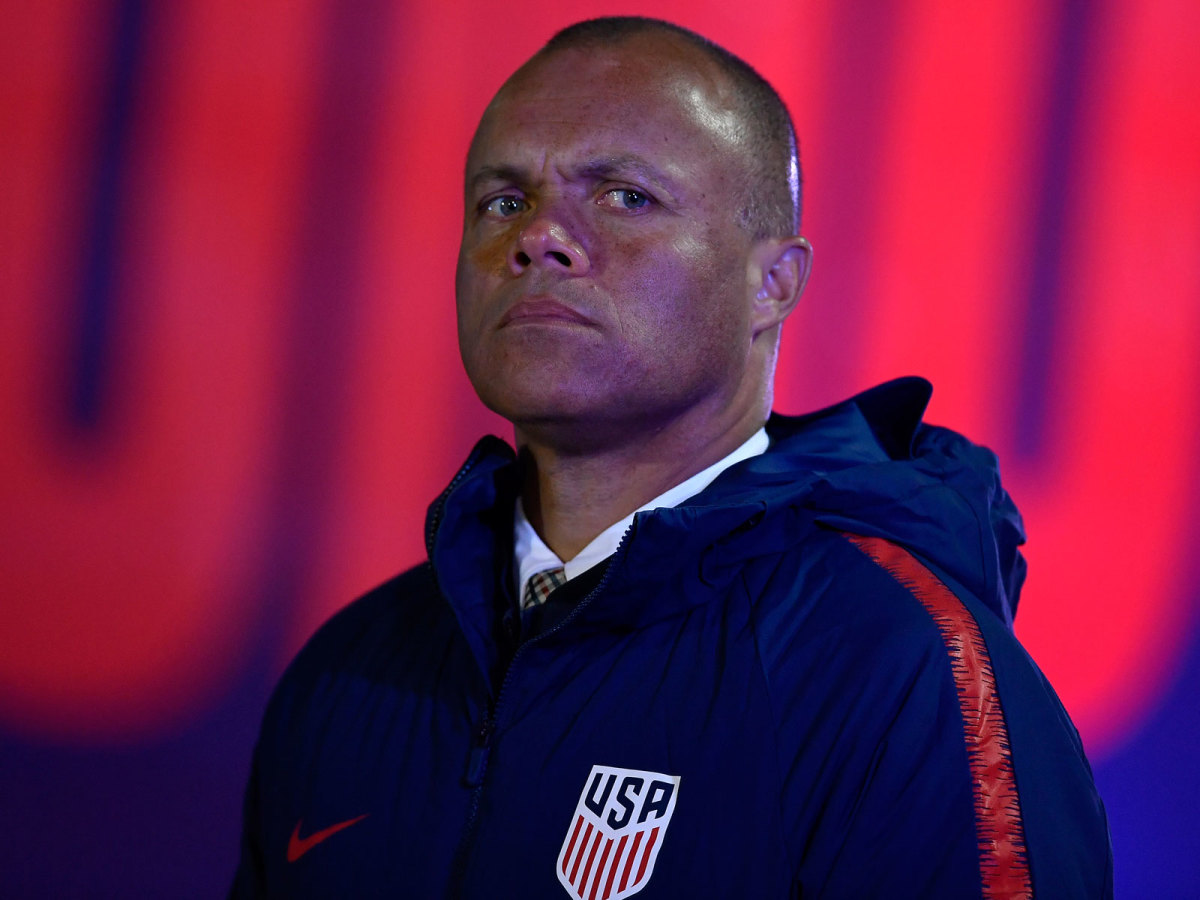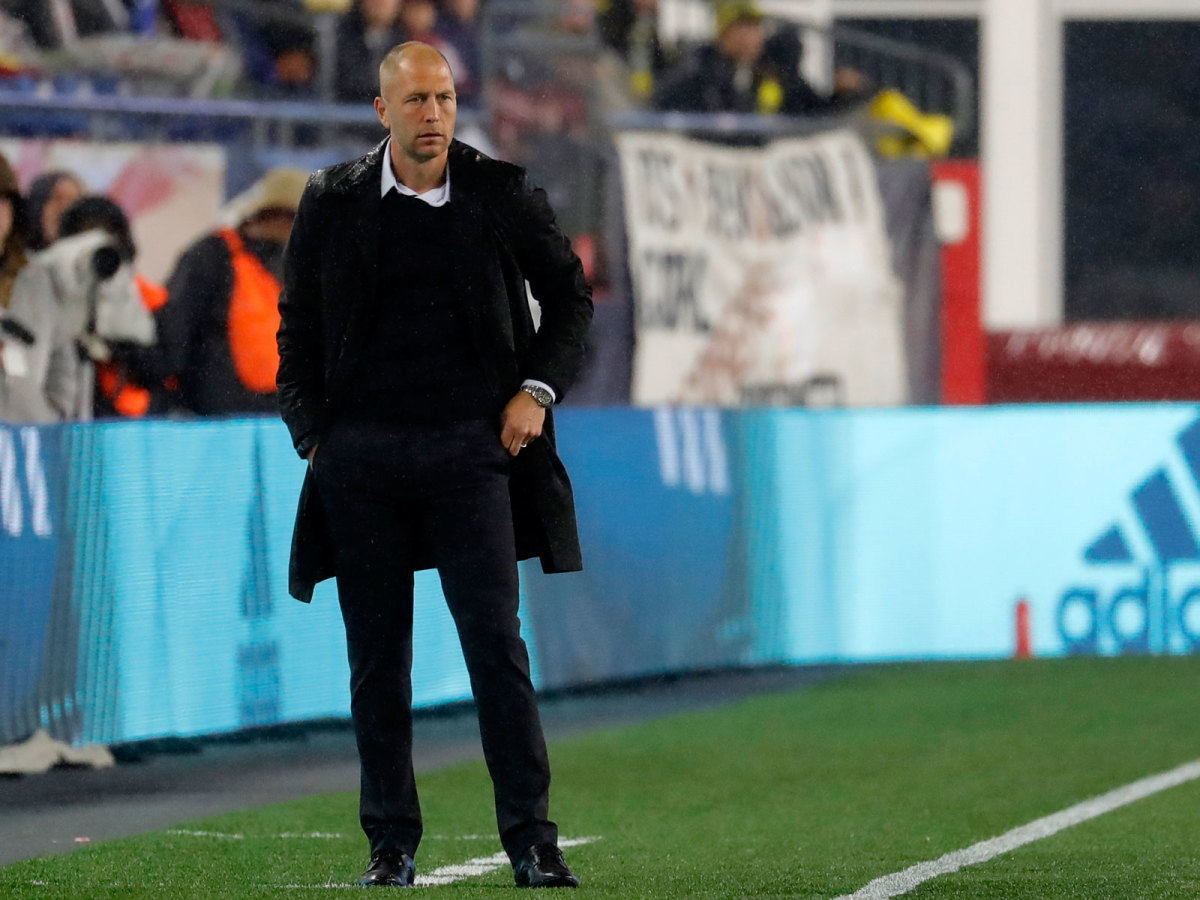U.S. Soccer's Process Adds Pressure, Colors Perspective of Gregg Berhalter's Hiring

Gregg Berhalter, the new U.S. men’s national team coach, might well end up being a good choice for the job, and ultimately that’s the most important thing. But U.S. Soccer’s ham-handed process to name the coach has piled tons of unnecessary pressure on Berhalter’s shoulders, and now it will be up to Berhalter to overcome those federation-erected obstacles in the only ways possible—by winning, by restoring pride in U.S. men’s soccer and by making up for the year that has already been lost.
When Christian Pulisic said recently that all he wanted was “a guy with a real plan” to lead the USMNT, he could have been speaking for everyone who’s invested in the program. And Berhalter will have a coherent plan, not least because he has shown he can put one together and execute it over the past five seasons in Columbus as not just the head coach but also the sporting director. Berhalter’s teams have an identity, and his USMNT will as well.
We’ll have more opportunities to look closely at Berhalter and discuss his plans for the team. But it’s important for now to examine the ways in which U.S. Soccer mishandled the hiring process in a way that will make life even more difficult for Berhalter moving forward.
CREDITOR: USMNT's 2018 and Its Missed Opportunity
Let’s start with the interminable delay. Bruce Arena resigned as the USMNT coach on October 13, 2017. It has taken nearly 14 months to name Berhalter. Waiting until after World Cup 2018 to hire a coach would have made sense had it meant choosing a coach who had actually participated in the World Cup like Juan Carlos Osorio or Roberto Martínez. But that’s not why U.S. Soccer waited. And now, instead of having a head start on the rest of the world in this World Cup cycle, the USMNT is now four months behind everyone else.
(Nor is it an adequate excuse that the 14-month delay was due to U.S. Soccer needing to elect a new president and hire a USMNT general manager. Nearly six months passed from the moment Carlos Cordeiro was elected president in February to the moment Earnie Stewart took over as GM on August 1 and started working. That’s not acceptable.)
Then there’s the interview process itself. None of the following candidates received a formal interview from Stewart: Tata Martino, Peter Vermes, Jesse Marsch, Tab Ramos, Osorio, Bob Bradley or Julen Lopetegui (who coached Spain to an unbeaten record for two years and contacted U.S. Soccer expressing interest but was told the federation was too far along in its process).
Doug McIntyre of Yahoo Sports reported that Stewart did formally interview Óscar Pareja in addition to Berhalter. But not formally interviewing any of the above candidates is a major problem. It’s hard to imagine an effective leader in a hiring capacity in any line of work who would not want to interview several people just to hear their ideas on how they would approach the job—in this case, coaching the U.S. men’s national team. An interview process with several candidates would likely bring extensive knowledge and surprises, both good and bad, about those candidates.

I went back to the media roundtable interview that Stewart gave on September 6. Stewart said he’d had brief conversations with “six or seven coaches” or their agents, adding that he’d pick up the phone if he was called. But Stewart was careful to explain that he considered a formal interview to be something more significant than that.
“I think interview, I think it goes a little bit further,” he said. “How I look at it, once you interview, you are in a very serious phase.” Stewart said he had taken time to construct what he called “a profile” for what he was looking for in a coach, a desired playing style and an idea of what he wants the USMNT to be.
When asked if he had a number of candidates in mind to formally interview, perhaps four or five, he said: “That’s why the profile is set. What I believe is you sit down with the person that you want, and then you have discussions with them, and long and very hard discussions. And then it works or it doesn’t work … From a profile, from a style of play, from all those things, there’s going to be somebody that jumps out.”
The interview process that Stewart describes seems like it would be a big advantage for any candidate he already knows and a disadvantage for any candidate he would be less familiar with. What possible negatives would there have been from formally interviewing other candidates? That the news got out in the media? Who cares?
The long press release that U.S. Soccer put out on Sunday took pains to name Stewart’s profile criteria and say—in bold print, no less—that Stewart made a list of 33 coaches, narrowed that list to 11 and then narrowed that list to two finalists. But curiously, considering how specific Stewart was in September describing the differences between “conversations” and “formal interviews,” the press release didn’t say how many candidates Stewart formally interviewed. Two? Maybe three?
Once again, Berhalter might end up being a good choice. But U.S. Soccer’s process is saying: We think Berhalter is such a remarkable candidate that we didn’t even need to interview Martino, Vermes, Marsch, Ramos, Osorio, Bradley or Lopetegui. And Berhalter hasn’t achieved nearly enough in his coaching career to merit such a distinction. He has yet to win a trophy. He was fired after a season and a half coaching Hammarby in Sweden. His career coaching record is 92 wins, 80 losses and 67 ties.
WAHL: A Year After USA's World Cup Qualifying Failure, What Really Changed?
What’s more, U.S. Soccer’s message that Berhalter was the only serious candidate among those coaches looks even worse when you know that his brother, Jay, is one of the most powerful people at U.S. Soccer and currently serves as the federation’s chief commercial and strategy officer (a commercial, not technical, role).
If there was one big message that came out of the heated campaign for the U.S. Soccer presidency earlier this year, it was that people are concerned about conflicts of interest in the federation—headed by the role of Soccer United Marketing, a for-profit company owned by MLS owners that has a lucrative rights deal through 2022 with non-profit U.S. Soccer.
I’m not saying the fix was in when it came to naming Berhalter, but it just looks bad. U.S. Soccer has insisted that Jay Berhalter has not been part of the search process for the USMNT coach because his work no longer involves the technical side of the game. But he was heavily involved in the hiring process for Stewart, the GM, who is the one in charge of hiring the coach (which also requires the approval of the U.S. Soccer board of directors).
Back on February 19, when Jay Berhalter still had a role on the technical side of U.S. Soccer—he got his new job title in April—I received this text from one of my sources, a respected figure inside U.S. Soccer whom I had asked about the possibilities for who would become the USMNT GM:
“Possibly Earnie Stewart as GM, because Jay (who makes all decisions) likes analytics and thinks that’s most important … I think there is a match there.”
Sure enough, Stewart would indeed be named MNT GM on June 6. And in Stewart’s media roundtable on September 6, he brought up some elements that would influence his thought process on hiring the coach. “There’s some extra layers that come into that,” he said. “I’ll name one of them: That comes to data. So the profile is connected now to data, and we’ll have data points that show a little bit of that. After that, it’ll probably pinpoint itself.”
Mindful of the text I had received about Jay Berhalter, Stewart and analytics in February, I followed up by asking Stewart in September to elaborate more on what he meant by using data in terms of his coaching search.
“When we look at our style of play, the things that are in there, we believe that in the United States that we are a country that are aggressive in the right sense of the word, that we’re a little bit in-your-face,” Stewart replied. “So you can imagine that if you say that, that there’s also a way that that could be implemented in a system, in a formation by a coach. And then you can actually look if the coaches, do they have that style?”
“And some are not that way. Others are. And that’s the data that would go into that—as an example, though, not necessarily saying that is it. But as an example, make sure that subjectiveness meets the objectiveness. I think the more information you have, the better that it is. Yes, that’s important. If I have a view, the way we look at soccer can be very romantic sometimes. You see something in front of you and have this certain idea about it, and then you find out later on actually when you see data points of that that the eye doesn’t really meet what is happening on the field. Because for some reason you see it in a different way. And that’s not good. So I want to make sure that that’s backed up with that. And it’s always one and the other. It’s never one by itself.”

There’s nothing wrong with using analytics as a tool to help make a hiring choice. Having more information is good, which is why it would have been better had Stewart interviewed more candidates. But it’s also crystal clear that Jay Berhalter had a major role in the process that resulted in U.S. Soccer hiring Gregg Berhalter, a process that did not view Martino, Vermes, Marsch, Ramos, Osorio, Bradley or Lopetegui as serious candidates. Being Jay’s brother should not have disqualified Gregg from being a candidate for the job. It should have absolutely disqualified him from appearing to be the only seriouscandidate.
Jay Berhalter may well be a talented guy, which is what I have heard over the years from people I respect. Still: It should go without saying that he has no business being a candidate to replace Dan Flynn as the next CEO of U.S. Soccer next year now that Gregg Berhalter is the USMNT coach. (Nor, for that matter, should the new CEO come from inside U.S. Soccer, which needs some new blood at the top.) But when it comes to U.S. Soccer and the appearance of conflicts, you never take anything for granted.
Many of those people that I respect—most of whom work in soccer outside the federation—also think Gregg Berhalter is a good hire. We’ll find out eventually based on what happens on the field. But he shouldn't be happy about a U.S. Soccer process that has only heaped a pile of unneeded pressure on his back.
